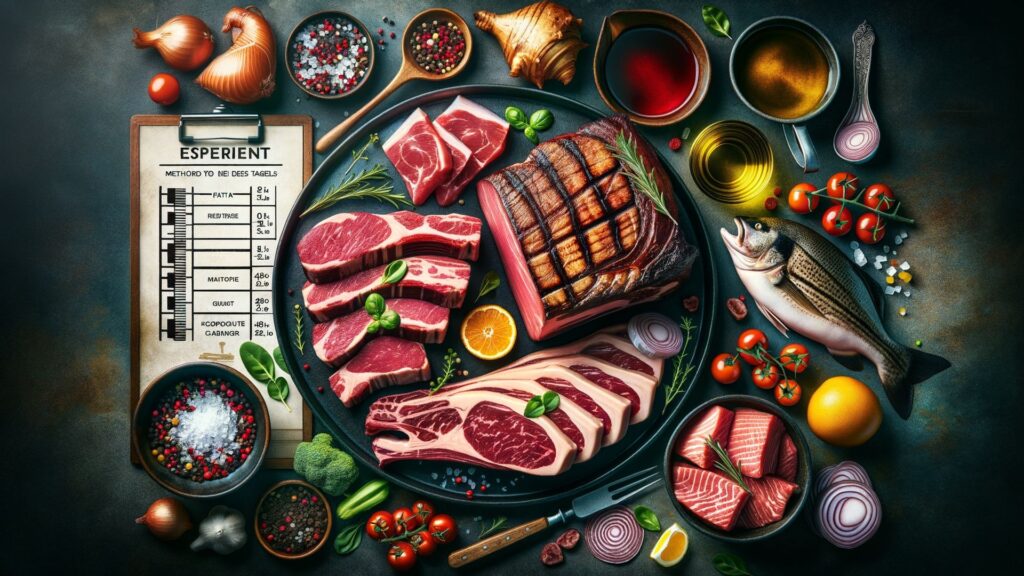How to Balance Macros on the Carnivore Diet
The carnivore diet, an increasingly popular way of eating, emphasizes the consumption of animal products while excluding all plant-based foods. This unique diet presents both challenges and opportunities for those wishing to balance their macros effectively. In this article, we will explore how to manage your macro balance on the carnivore diet, focusing on protein and fat intake, while also considering the benefits and potential risks associated with this high-protein, high-fat lifestyle.

What is the Carnivore Diet and How Does it Impact Macros?
Defining the Carnivore Diet
The carnivore diet consists exclusively of animal products, including meat, fish, eggs, and certain dairy items. This low-carb diet aims to eliminate all plant-based foods, which proponents argue can lead to improved health outcomes. By following the carnivore lifestyle, individuals consume high amounts of protein and fat while completely avoiding carbohydrates. This way of eating is often compared to the ketogenic diet; however, the key difference lies in the exclusion of all plant matter.
Understanding Macros on a Carnivore Diet
When discussing macros on the carnivore diet, it is essential to focus on the two primary macronutrients: protein and fat. The diet is typically high in protein, which is crucial for muscle repair and growth, while also emphasizing the importance of fat for energy and hormone production. Balancing these macros can help individuals meet their nutritional needs while adhering to the principles of the carnivore diet. The goal is to consume enough calories per day to support overall health without overindulging in either protein or fat.
How the Carnivore Diet Differs from a Ketogenic Diet
While both the carnivore diet and the ketogenic diet promote low carbohydrate intake, they differ significantly in their approach. The keto diet allows for a variety of foods, including low-carb vegetables and nuts, whereas the carnivore diet strictly limits intake to animal products. This leads to a higher protein intake per meal on the carnivore diet, as individuals focus on eating meat for their macronutrient needs. Additionally, the carnivore diet may result in higher saturated fat consumption due to the types of fats present in animal products, further differentiating it from the more varied fat sources available in a ketogenic diet.
How Much Protein Should You Eat on a Carnivore Diet?
Calculating Protein Intake Based on Body Weight
To determine how much protein to eat on the carnivore diet, it is essential to calculate your protein intake based on your body weight. A common recommendation is to consume approximately one gram of protein per pound of body weight. For instance, if you weigh 150 pounds, you should aim to consume around 150 grams of protein per day. This calculation ensures that you are eating enough protein to support muscle maintenance and overall health, particularly when following a high-protein, high-fat diet.
Daily Protein Recommendations for Carnivore Diet
The daily protein recommendations for individuals following the carnivore diet can vary based on activity levels, age, and individual health goals. Generally, aiming for 1.0 to 1.5 grams of protein per pound of body weight is advisable for those who engage in regular physical activity. This range ensures adequate intake to support muscle recovery and growth while also promoting satiety. It is crucial not only to focus on protein quantity but also on the quality of the protein consumed, favoring lean cuts of meat, organ meats, and fatty fish.
Sources of Protein in Animal Products
Animal products are the primary sources of protein in the carnivore diet. High-quality protein can be found in various meats, such as beef, pork, chicken, and lamb, as well as in fish and seafood. Eggs also serve as an excellent source of protein, providing essential amino acids necessary for bodily functions. Moreover, certain dairy products like cheese and yogurt can contribute to your protein intake, provided they are well-tolerated. It is essential to diversify your protein sources to ensure a balanced diet while adhering to the carnivore principles.
How to Ensure You Eat Enough Fat on the Carnivore Diet?
Importance of Fat in the Carnivore Diet Macro Balance
Fat plays a critical role in the macro balance of the carnivore diet. It serves as a primary energy source, especially when carbohydrate intake is minimal. Including sufficient fat in your diet is vital for maintaining energy levels, supporting hormone production, and promoting overall health. The carnivore diet emphasizes the consumption of healthy fats, particularly saturated fats found in animal products, which can provide numerous benefits when consumed in moderation.

How Much Fat Should You Include Per Meal?
Determining how much fat to include per meal on the carnivore diet largely depends on individual energy needs and overall dietary goals. A general guideline is to aim for a fat intake that complements protein consumption, usually around 70% to 80% of your total caloric intake. For example, if you consume 2,000 calories per day, approximately 1,400 to 1,600 calories should come from fat. This translates to about 155 to 175 grams of fat per day, depending on your specific caloric needs. Balancing fat and protein intake is essential to ensure you are consuming enough calories while following the carnivore diet.
Best Fat Sources to Include in Your Diet Plan
When following the carnivore diet, selecting high-quality fat sources is imperative. Some of the best fat sources include fatty cuts of meat, such as ribeye and pork belly, as well as organ meats like liver, which are nutrient-dense. Additionally, including butter and ghee can provide healthy fats while enhancing the flavor of your meals. Bone marrow and rendered animal fats, such as tallow or lard, are also excellent options. Ensuring a variety of fat sources can help achieve the necessary macro balance while adhering to the carnivore principles.
What Are the Risks of Undereating on a Carnivore Diet?
Understanding Undereating and Its Effects
Undereating on the carnivore diet can lead to several adverse effects, including nutrient deficiencies, loss of muscle mass, and fatigue. Consuming insufficient calories can hinder your ability to maintain energy levels and perform daily activities effectively. Furthermore, a lack of adequate protein and fat can negatively impact your overall health and well-being, underscoring the importance of understanding your macro needs while following this restrictive diet.

Signs You Are Not Eating Enough on a Carnivore Diet
Identifying signs of undereating is crucial for those following the carnivore diet. Common symptoms include persistent fatigue, decreased strength, weight loss, and increased cravings for food. Additionally, mood swings and irritability may indicate that you are not consuming enough calories or macros. If you experience these symptoms, it may be necessary to reassess your intake and ensure you are meeting your body’s needs.
How to Adjust Your Intake to Meet Macro Needs
To adjust your intake effectively on the carnivore diet, begin by tracking your food consumption and evaluating your macro ratios. Ensure that you are consuming enough protein and fat to meet your individual needs, as outlined in previous sections. If you find that you are falling short, consider increasing portion sizes or incorporating additional high-quality protein and fat sources into your meals. Regularly monitoring your intake can help you achieve the ideal macro balance on the carnivore diet.
What Are the Benefits of Following the Carnivore Diet?
Health Benefits Associated with a High-Protein, High-Fat Diet
The carnivore diet may offer several health benefits, particularly due to its high-protein and high-fat nature. Many individuals report improved energy levels, enhanced mental clarity, and better satiety when consuming a diet rich in animal products. Furthermore, the reduction in carb intake may lead to stabilized blood sugar levels, which can be beneficial for those with insulin resistance or metabolic syndrome.
How the Carnivore Diet May Affect Blood Sugar Levels
One of the significant benefits of the carnivore diet is its potential to positively influence blood sugar levels. By eliminating carbohydrate intake, individuals can experience reduced fluctuations in blood sugar, leading to improved overall metabolic health. This stabilization can help mitigate the risk of developing type 2 diabetes and may enhance insulin sensitivity. The carnivore diet may provide a feasible option for those seeking to manage their blood sugar effectively.
Long-Term Benefits of Proper Macro Balance on the Carnivore Diet
Maintaining a proper macro balance on the carnivore diet can yield long-term benefits, including improved body composition and enhanced physical performance. By ensuring adequate protein and fat intake, individuals may experience increased muscle mass, decreased body fat, and a more sustained energy level throughout the day. Over time, these benefits can lead to a healthier lifestyle and improved quality of life, making the carnivore diet an appealing option for those willing to commit to its principles.
Get Enough Calories On The Carnivore Diet Frequently Asked Questions:
Q: What should I eat on the carnivore diet?
A: On the carnivore diet, you will primarily eat animal products, including meat, fish, eggs, and some dairy. This means focusing on high-protein and fat foods while eliminating all plant-based foods.
Q: How much should I eat on the carnivore diet?
A: The amount of food you need to eat on the carnivore diet varies based on factors like your body weight, activity level, and goals. Generally, you should aim for a balance of protein and fat, adjusting your portions to meet your personal caloric needs.
Q: How many calories should I consume in a day on the carnivore diet?
A: The calories in a day on the carnivore diet will depend on your specific requirements. Typically, individuals may consume anywhere from 1,500 to 3,000 calories, depending on their size and activity levels, while focusing on protein and fat intake.
Q: What are the benefits of the carnivore diet?
A: The benefits of the carnivore diet can include weight loss, improved mental clarity, and reduced inflammation. Since the carnivore diet eliminates carbohydrates, many people experience stable energy levels and reduced cravings.
Q: How can I create a carnivore diet meal plan?
A: To follow the diet effectively, create a meal plan that includes a variety of meats and animal products. You might choose beef, pork, chicken, fish, eggs, and dairy. Focus on achieving a balance of protein and fat in each meal.
Q: Can the carnivore diet help with weight gain?
A: While the carnivore diet is often associated with weight loss, it can also help with weight gain if you consume enough calories and choose higher-fat cuts of meat. The key is to ensure you are eating sufficient protein and fat to meet your caloric needs.
Q: How much protein and fat should I aim for on the carnivore diet?
A: A common recommendation is to aim for a macronutrient ratio of about 70% fat and 30% protein, but this can vary. Many calories from fat come from fatty cuts of meat, while protein intake can be derived from leaner sources.
Q: What happens if I eat too many carbs on the carnivore diet?
A: The carnivore diet eliminates carbs entirely, which means if you consume them, you may not be following the diet correctly. Eating carbs can lead to fluctuations in blood sugar levels, cravings, and may hinder the benefits of the carnivore diet.
Q: How can I adjust my eating plan if I find myself eating too much or too little?
A: If you’re not achieving your desired outcomes, monitor your intake of protein and fat closely. Adjust portion sizes based on your hunger levels and energy needs. It may also be beneficial to track your calories in a day to find a suitable balance.




